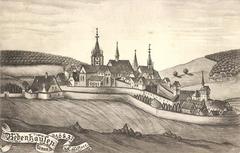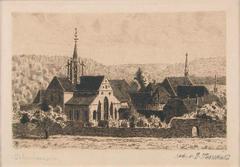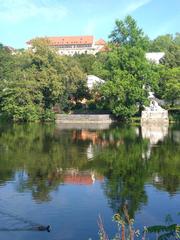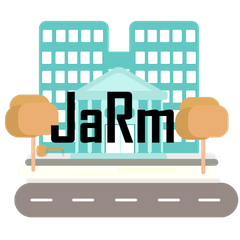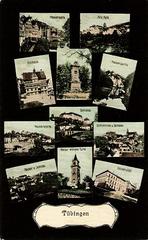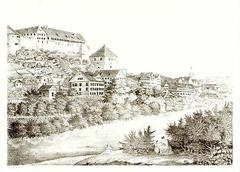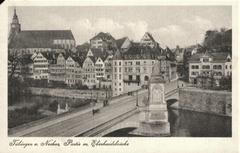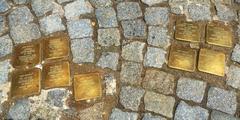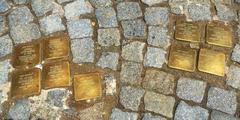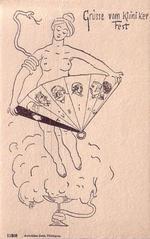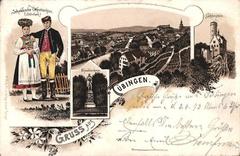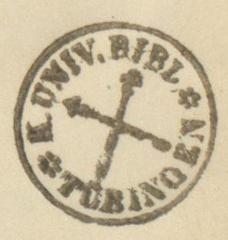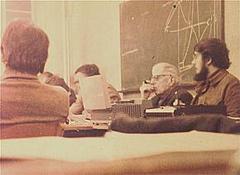Evangelische Hochschule Für Kirchenmusik Tübingen: Visiting Hours, Tickets, and Guide
Date: 14/06/2025
Introduction
Nestled along the picturesque Neckar River in the university town of Tübingen, the Evangelische Hochschule für Kirchenmusik Tübingen is a renowned institution for church music education and heritage. Housed in the architecturally significant Schwabenhaus—a protected Rococo and Jugendstil-influenced monument built in 1899—the Hochschule provides a unique blend of history, vibrant musical tradition, and engaging cultural experiences. Founded in 1945 and relocated to Schwabenhaus in 1998, it serves both as a center for future church musicians and as a public cultural hub with one of Germany’s largest church music libraries, regular concerts, and workshops (Evangelische Hochschule für Kirchenmusik Tübingen; Schwabenhaus Tübingen).
Whether you are passionate about church music, considering specialized study, or exploring Tübingen’s historic charm, this detailed guide covers everything you need to know about visiting hours, ticketing, accessibility, concerts, and nearby attractions.
Table of Contents
- Willkommen an der Evangelischen Hochschule für Kirchenmusik Tübingen
- Historische Entwicklung und Standort
- Besuchsinformationen: Öffnungszeiten, Tickets und Anreise
- Highlights und besondere Attraktionen
- Sehenswertes in der Nähe
- FAQ – Häufig gestellte Fragen
- Fazit
- Historical and Architectural Significance
- Monument Status and Cultural Importance
- Usage History and Evolution
- Renovation and Modern Facilities
- Symbolism and Cultural Identity
- Visitor Information
- Practical Tips for Visitors
- Frequently Asked Questions (FAQ)
- Schwabenhaus Tübingen: Your Visitor’s Guide to a Historic Monument
- Visiting Evangelische Hochschule Für Kirchenmusik Tübingen: Events, Tickets & Access Guide
- Summary and Visitor Recommendations
- Sources and Further Reading
Willkommen an der Evangelischen Hochschule für Kirchenmusik Tübingen
Die Evangelische Hochschule für Kirchenmusik Tübingen ist eine der führenden Ausbildungsstätten für Kirchenmusik in Deutschland und ein bedeutender historischer Ort in Tübingen. Sie vereint jahrzehntelange Tradition mit innovativer musikalischer Ausbildung und bietet Besucher*innen kulturelle und architektonische Highlights.
Historische Entwicklung und Standort
Gegründet 1945 in Esslingen am Neckar, entstand die Hochschule, um nach dem Zweiten Weltkrieg qualifizierte Kirchenmusiker*innen für den Wiederaufbau des kirchlichen Lebens in Württemberg auszubilden. Seit 1998 befindet sie sich im denkmalgeschützten Schwabenhaus, einem Rokoko-Bauwerk von 1899 am Neckarufer und einem der Wahrzeichen Tübingens.
Besuchsinformationen: Öffnungszeiten, Tickets und Anreise
- Führungen: Nach Voranmeldung werden Führungen durch das Schwabenhaus und die Zentralbibliothek angeboten, mit Einblicken in die Sammlung von über 70.000 Medien und die Instrumente der Hochschule.
- Öffnungszeiten: Veranstaltungen wie Konzerte finden meist abends oder am Wochenende statt; aktuelle Zeiten sind auf der Website der Hochschule zu finden.
- Tickets: Für Konzerte und Workshops ist eine Anmeldung oder der Erwerb von Eintrittskarten empfohlen (Evangelische Hochschule Kirchenmusik Tübingen Veranstaltungen).
- Anreise: Die Adresse ist Gartenstraße 12, zentral am Neckarufer. Die Anbindung an öffentliche Verkehrsmittel ist gut, Parkplätze sind in der Nähe vorhanden.
- Barrierefreiheit: Das Schwabenhaus ist teilweise barrierefrei. Bitte melden Sie besondere Bedürfnisse im Voraus an.
Highlights und besondere Attraktionen
- Schwabenhaus: Historisches Gebäude im Rokoko-Stil mit moderner Ausstattung für Lehre und Konzerte.
- Zentralbibliothek: Eine der größten kirchenmusikalischen Sammlungen Deutschlands.
- Instrumentensammlung: Fünf Orgeln (inkl. einer norddeutschen Barockorgel), mehrere Flügel, Cembali und Keyboards.
- Konzerte/Workshops: Regelmäßige öffentliche Veranstaltungen mit vielfältiger Kirchenmusik.
- Ökumenische Kooperationen: Zusammenarbeit mit der Katholischen Hochschule für Kirchenmusik Rottenburg.
Sehenswertes in der Nähe
- Die mittelalterliche Altstadt mit Fachwerkhäusern
- Die evangelische Stiftskirche (regelmäßige Nutzung für Konzerte)
- Der Neckar mit Uferwegen und der Hölderlinturm
- Museen und weitere kulturelle Einrichtungen Tübingens
FAQ – Häufig gestellte Fragen
Gibt es regelmäßige Führungen?
Ja, Führungen sind nach Vereinbarung möglich.
Benötige ich Tickets für einen Besuch?
Für Konzerte/Workshops sind Tickets oder Anmeldung erforderlich, sonst ist das Gebäude nur im Rahmen von Veranstaltungen zugänglich.
Ist die Hochschule barrierefrei?
Teilweise; bitte melden Sie besondere Bedürfnisse vorab.
Gibt es Parkmöglichkeiten?
Ja, Parkplätze und ÖPNV-Anbindung sind vorhanden.
Fazit
Die Evangelische Hochschule für Kirchenmusik Tübingen ist Ausbildungsstätte und kultureller Schatz zugleich. Ob Kirchenmusik, Architektur, Geschichte oder Konzerte—ein Besuch lohnt sich. Informieren Sie sich vorab über aktuelle Veranstaltungen und nutzen Sie die Angebote der Institution.
Historical and Architectural Significance
The Schwabenhaus is a prominent example of Historicism with Art Nouveau influences, designed by Eisenlohr and Weigle in 1899–1900 (kirchenmusikhochschule.de). Its French Rococo style distinguishes it from Tübingen’s typical fraternity houses. Distinctive features include elegant façades, decorative stucco, and a large hall with restored sightlines to the Neckar (de.wikipedia.org; tuepedia.de).
Monument Status and Cultural Importance
Declared a cultural monument in the 1970s after civic advocacy, the Schwabenhaus stands as a symbol of heritage preservation. Its survival and renovation reflect Tübingen’s commitment to architectural and cultural values (veikkos-archiv.com).
Usage History and Evolution
Originally built as a fraternity house for Corps Suevia Tübingen, the Schwabenhaus has served as youth club, adult education center, and, since 1998, the home of the Evangelische Hochschule für Kirchenmusik Tübingen (kirchenmusikhochschule.de).
Renovation and Modern Facilities
Major renovations between 2015–2017 restored historical layouts, uncovered the balcony loggia, and modernized technical infrastructure. Today, the building offers acoustically optimized spaces, a large music library, and a diverse collection of high-quality instruments (kirchenmusikhochschule.de; tuepedia.de).
Symbolism and Cultural Identity
The Schwabenhaus is a testament to Tübingen’s cosmopolitan spirit and its ability to integrate tradition and innovation. Its preservation through community activism underscores the city’s dedication to its cultural legacy.
Visitor Information
- Visiting Hours: Public access during concerts, guided tours, and open house days—see Evangelische Hochschule für Kirchenmusik Tübingen.
- Tickets: Entry is usually free for open events; some concerts may require tickets.
- Accessibility: Modernized for accessibility, but advance inquiry for specific needs is recommended.
- How to Get There: Gartenstraße 12, near the Neckar and Old Town; well-connected via public transport.
Practical Tips for Visitors
- Enjoy the panoramic view from the first-floor balcony loggia.
- Attend a concert to experience historic instruments and acoustics.
- Pair your visit with a walk along the Neckar or through Tübingen’s Altstadt.
Schwabenhaus Tübingen: Your Visitor’s Guide to a Historic Monument
- Location: Gartenstraße 12, Tübingen.
- General Access: Weekdays 9:00–18:00; specific areas may be restricted during academic events.
- Tickets: Free for exterior/public spaces; fees may apply for guided tours.
- Tours: Advance booking recommended, especially in high season.
- Accessibility: Ramps/lifts have been added where possible. Contact ahead if you have mobility concerns.
- Nearby: Hölderlinturm, Old Botanical Garden, Neckarfront.
- Photography: Permitted outdoors; indoor photography may be restricted during events.
Visiting Evangelische Hochschule Für Kirchenmusik Tübingen: Events, Tickets & Access Guide
Campus and Accessibility
- Location: Gartenstraße 12, near Altstadt.
- Transport: Walk, bike, bus; limited parking.
- Accessibility: Step-free access and accessible restrooms; contact for specific needs.
Visiting Hours and Tours
- No regular public hours; open on event days and for special tours. Contact administration for arrangements (kirchenmusikhochschule.de).
Musical Events and Performances
- Concerts: Regular student, faculty, and guest artist performances, often in collaboration with local churches.
- 2025 Highlights:
- Zelenka/Mozart Requiem: 8 Feb, Domkirche St. Martin, Rottenburg; 9 Feb, Stiftskirche Tübingen.
- Bach-Kantate zum Mitsingen: 28–29 June, Stiftskirche Tübingen (kirchenmusik-hochschule.org; stiftskirche-tuebingen.de).
Tickets and Reservations
- Tickets (€10–25) via kirchenmusik-hochschule.org. Early booking advised.
Community Engagement
- Inclusive choirs and open rehearsals; experienced singers may join the Hochschulchor after consultation.
- Collaborative projects with the Hochschule für Kirchenmusik Rottenburg and local congregations.
Nearby Attractions
- Explore Tübingen’s Altstadt, Neckar riverside, Hölderlinturm, and University.
Visitor Tips
- Plan ahead using official event calendars.
- Use public transport or bikes.
- Respect church settings during events.
FAQs
- Ticket prices: €10–25; concessions available.
- Guided tours: On request or during open house days.
- Accessibility: Step-free and accessible restrooms.
- Choir participation: Contact choir directors via the official website.
Summary and Visitor Recommendations
The Evangelische Hochschule für Kirchenmusik Tübingen, housed in the historic Schwabenhaus, offers a unique interplay of architectural heritage, musical tradition, and community involvement. Its journey from fraternity house to premier educational and cultural institution exemplifies Tübingen’s dedication to preservation and artistic innovation. Visitors are invited to explore its impressive Rococo and Jugendstil architecture, experience outstanding concerts and workshops, and participate in the lively sacred music scene.
With extensive accessibility features and community-focused programming, the Hochschule stands as a vibrant cultural landmark. Combine your visit with Tübingen’s historic old town, riverside, and museums for a holistic cultural experience. For current events and tickets, consult the official websites and consider following the community on social media or via cultural apps like Audiala.
Experience the harmonious blend of history, music, and culture that defines this remarkable institution (Evangelische Hochschule für Kirchenmusik Tübingen; Schwabenhaus Tübingen; HKM Tübingen Events).
Sources and Further Reading
- Evangelische Hochschule für Kirchenmusik Tübingen: Geschichte, Besuchsinformationen und Highlights
- Schwabenhaus Tübingen: Visiting Hours, History & Cultural Highlights
- Schwabenhaus Tübingen Wikipedia
- Schwabenhaus Tübingen History and Renovation
- Visiting Schwabenhaus in Tübingen: A Historic Monument and Cultural Landmark Guide
- Visiting Evangelische Hochschule Für Kirchenmusik Tübingen: Events, Tickets & Access Guide
- Stiftskirche Tübingen Church Music Information
- Tübingen Tourism Portal
